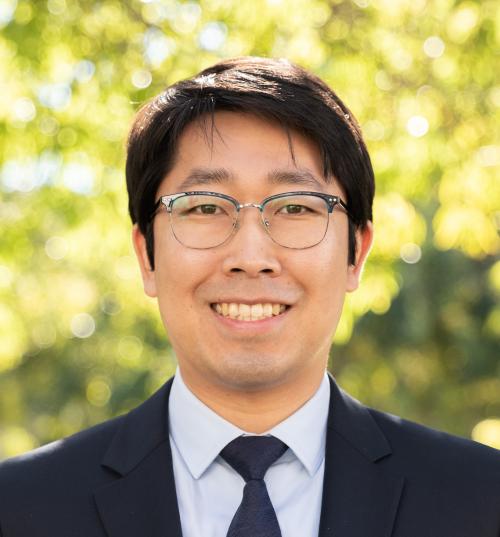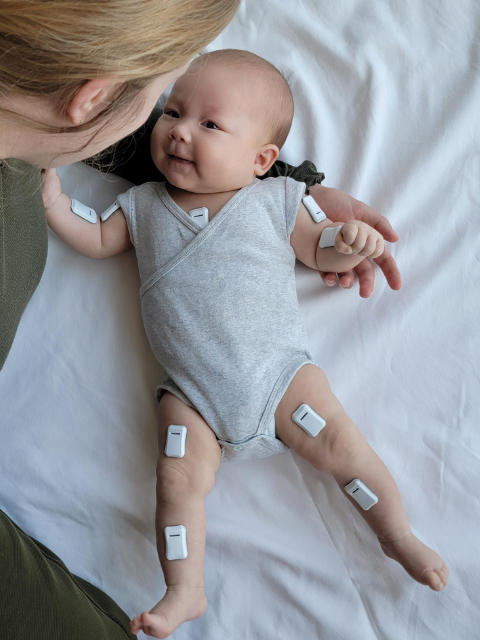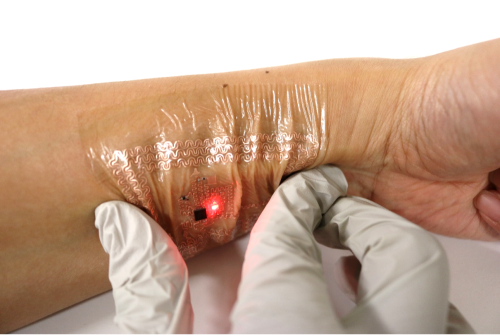Hyoyoung Jeong Joins Department of Electrical and Computer Engineering

Hyoyoung Jeong, a scholar whose work at the interface of bio-integrated electronics and medical applications has gained international media attention, is the newest faculty member within the Department of Electrical and Computer Engineering at UC Davis.
Assistant Professor Jeong’s work focuses on wireless stretchable electronics such as e-tattoo for personalized healthcare monitoring. These devices are at the forefront of the next-generation wearables for human-machine interface, telemedicine, mobile health and digital medicine. He started in his position in the College of Engineering in July 2022.
A desire to develop advancing human health platforms
Jeong first became interested in his research idea after working as a researcher and developer for the Samsung Advanced Institute of Technology’s advanced smartphone hardware and mobile healthcare groups in Korea. There he worked on the earliest versions of health monitoring devices associated with wearable smartwatches, but was discouraged at how lacking the technology was at the time for tracking things such as blood pressure.
“I really wanted to make more of a skin-interface device. That’s why I quit working for that leading company in Korea and came to pursue my Ph.D. in the U.S.,” Jeong said.
He attended graduate school at The University of Texas at Austin, earning his doctorate degree from their Department of Electrical and Computer Engineering with a doctoral thesis on modular and reconfigurable wireless e-tattoos. He then became interested in real-world clinical applications of skin-interfaced platforms. Jeong then sought a postdoctoral scholar position at Northwestern University which features an active collaboration between its engineering school and medical centers. As a postdoc, Jeong published 19 journal papers, including six first-author papers including journals such as Science, Science Advances and PNAS, and filed five patents for his work on medical applications.
“I really love that type of application—measuring some human signals with wearable devices, especially the clinical applications,” said Jeong, who obtained his bachelor’s and master’s degrees in biomedical engineering.
Numerous applications for wireless skin-interfaced devices, including his own child

The e-tattoos feature multiple layers, each with their own functionalities: a near field communication layer capable of wireless power harvesting and data transmission, a functional circuit layer, and a passive electrode/sensor layer. These layers can then be arranged in multiple variations to form different e-tattoos that can provide different sensing capabilities for various diseases as well as patients.
For example, Jeong was part of a collaborative project to develop the first-ever transient pacemaker — a fully implantable, wireless device that harmlessly dissolves in the body after it’s no longer needed. Likewise, his devices have been used to track symptoms of COVID-19 patients and early detection of infant neuromotor pathologies for newborns. For his work related to infants, Jeong actually tested the devices on his wife when she was pregnant with their first child, who is now a little more than a year old.
“During my fetal monitoring study my wife was pregnant so I tried my sensors on my wife,” Jeong said with a laugh. “So in my papers, the model in my figure set is my wife. She loved my technology. She’d always read my paper and give valuable feedback as an end-user.”
For his work, Jeong has pursued 18 patents (nine have been granted) and has been invited to give more than a dozen talks throughout the United States, Switzerland and South Korea. His research has been highlighted in multiple widely circulated news stories, including BBC News, The New York Times, Wall Street Journal, the Chicago Tribune and ABC News outlets. The key to this success, according to Jeong, has been collaboration.
“I published papers and had achievements during my Ph.D. and postdoc because I worked with so many different people in a very multidisciplinary way,” Jeong said. “My current research is super interdisciplinary. If we work alone it’s very hard to get good and meaningful data.”
Eager for collaborations

Jeong said he is happy to be a part of the College of Engineering because of the culture of collaboration that exists among the faculty. Jeong said he is eager to forge collaborative working relationships with colleagues in the School of Veterinary Medicine and College of Agricultural and Environmental Science at UC Davis, as well as UC Davis Health.
“I also want to enlarge my research from human monitoring to animal and agricultural monitoring, and UC Davis is so well known for its agriculture and animal science programs,” Jeong said. “I think there are a number of ways you could use my technology to monitor plants and animals because the e-tattoos are completely flexible. So I’m really excited to be here at UC Davis.”

